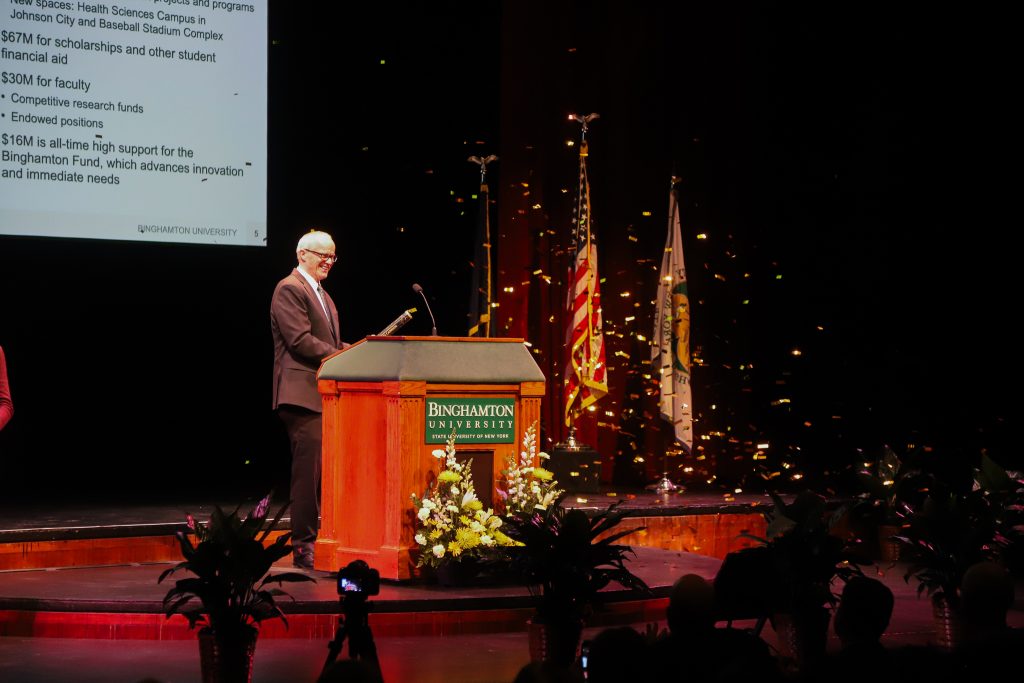As the curtain begins to close on University President Harvey Stenger’s 13-year tenure at the helm of the administration, around 400 students, faculty and community leaders gathered to hear him deliver his final State of the University address. The annual event focused primarily on this year’s accomplishments, including national ranking highlights, construction developments, ongoing research and student enrollment.
“I tell people, this is a good time. You want to leave when things are great because that will attract a superstar president for the next term,” said Stenger, who announced in October 2024 that he would step down at the end of this academic year.
Stenger opened with a video from Forbes Magazine, which recently featured BU in an article titled “Why Smart Kids & Cost Conscious Parents Flock to Binghamton.” In this video, Emma Whitford, the journalist who created the Forbes ranking system for Public Ivies, described her enthusiasm about the University’s placement, as it shares the list with schools with greater national recognition, like the University of Michigan.
“I know I’m preaching to the choir when I say this to the people in this room, but things like being named a top-10 Public Ivy and the follow-up story from Forbes makes me feel excited about Binghamton’s future,” Stenger said.
The University was featured this year in a number of prestigious rankings in addition to the Forbes list. Among those were the Wall Street Journal, which named Binghamton the No. 1 SUNY, and The Princeton Review’s list of top-20 public universities for career placement.
The recent recognition comes at a time of immense growth and opportunity for students and faculty alike, Stenger added. He described the largely successful EXCELERATE campaign, which ended in June 2024 and brought in $261.6 million from around 35,000 individual contributors. These funds will allow for significant contributions to student scholarship funding, faculty research and the “student experience,” which includes internships, research and other academic programming.
“It’s an incredible accomplishment for our advancement team and all the faculty and staff who are involved in the campaign,” Stenger said. “Thank you to our donors who have so graciously and generously given back to Binghamton.”
Thanks to the $575 million allocated for renovations and construction between 2024 and 2027, the University’s physical presence will expand, with projects like a $60 million lecture hall and new health science buildings in Johnson City.
Stenger said the combined number of undergraduate and graduate students at BU has increased by 40.9 percent since 2011. Hiring is climbing at a faster rate, with the number of full-time tenure and tenure-track faculty growing by 63.3 percent in the same time frame.
Boasting of selectivity in the admissions process, Stenger said the University accepted 39 percent of first-year undergraduate applicants last year. He compared this to Stony Brook University’s and the University of Buffalo’s acceptance rates: 49 percent and 69 percent, respectively.
Stenger mentioned new local partnerships, including a new memoranda of understanding with BAE Systems and the Guthrie Clinic, promising to greatly benefit faculty and students. Significant advancement is also being made in the New Energy New York program, including Battery NY, which focuses on producing new battery technologies.
Celebrating accomplishments by both faculty and students, Stenger emphasized the global impact faculty members have made in the past year. While sharing strides in several areas of research, he cited a Stanford University study that found that 33 faculty members at BU, across five of the University’s six schools, were among the top two percent in their field worldwide.
He also reflected on faculty contributions toward the larger community, like the Harriet Tubman statue that will be unveiled on March 21 at the University Downtown Center — an effort spearheaded by the University’s Harriet Tubman Center for Freedom and Equality. He congratulated Emily Mackay ‘21, who represented the United States at the 2024 Olympics in the 1500m event.
“Harvey’s love for Binghamton and all its faculty, staff, alumni, and students is beyond evident,” Mackenzie Cooper, the BU Council representative and a senior majoring in philosophy, politics and law in the 4+1 Master’s in Public Administration program, wrote to Pipe Dream. “The fact that I am even able to comfortably refer to my University President by his first name is unheard of! As I have been able to connect with faculty and administrators as Council Representative these past months, everyone seems to share the same perspective: We’ll miss you, Harvey.”
In a press opportunity before the event, Stenger said it was the students who initially drew him to the highest leadership position at the University.
“I remember standing pretty close to here, 13-and-a-half years ago, and they said, ‘Why did you pick Binghamton? Why did you come to Binghamton?’ Stenger said, referring to the media. “I said because ‘Binghamton gets it,’ and I didn’t have to say anything more.”



